
ACTA MUSICOLOGICA
Scope & Guideline
Exploring the Depths of Musicology
Introduction
Aims and Scopes
- Interdisciplinary Research:
The journal embraces an interdisciplinary approach, integrating perspectives from history, cultural studies, and music analysis to explore the multifaceted nature of music. - Historical Contextualization:
A significant focus on historical musicology allows for the exploration of music within its temporal and cultural contexts, contributing to a richer understanding of its evolution and impact. - Cultural Studies and Ethnomusicology:
The journal examines music as a cultural phenomenon, often addressing non-Western traditions and the global influences that shape contemporary music practices. - Music and Identity:
Explorations of how music intersects with personal and collective identities, including themes of nationalism, migration, and religious practices, are prevalent. - Analysis of Performance Practices:
ACTA MUSICOLOGICA often investigates performance practices, especially through the lens of historical recordings and contemporary interpretations, revealing insights into expressive techniques.
Trending and Emerging
- Global Musicology:
A significant increase in articles addressing global musicology highlights the journal's commitment to exploring music across cultural boundaries, reflecting the interconnectedness of music practices worldwide. - Music and Migration:
Themes surrounding music shaped by transnational migration have gained prominence, emphasizing how migration influences musical forms and identities in contemporary contexts. - Interdisciplinary Epistemologies:
There is a growing interest in connective epistemologies that bridge various disciplines, encouraging innovative methodologies and collaborative research in music studies. - Performance and Recording Analysis:
The examination of historical performance practices through early recordings has become a notable trend, revealing new insights into interpretative choices and cultural significances. - Cultural and Religious Intersections:
Research exploring the intersections of music with cultural and religious identities, especially in postcolonial contexts, has emerged as a vital area of inquiry, reflecting contemporary societal dynamics.
Declining or Waning
- Traditional Western Music Studies:
There has been a noticeable reduction in papers exclusively focused on traditional Western classical music, as the journal increasingly prioritizes global and cross-cultural perspectives. - Static Historical Narratives:
Papers that offer linear historical narratives without engaging with contemporary theoretical frameworks or interdisciplinary approaches have become less frequent. - Regional Musicology:
Research focused solely on specific regional music traditions without connecting to broader global trends or issues appears to be waning, indicating a shift towards more integrative studies.
Similar Journals

MUSICAL TIMES
Connecting Researchers to the Heart of Music StudiesMUSICAL TIMES is a distinguished journal dedicated to the exploration and dissemination of scholarly works in the realm of music, serving as an essential resource for researchers, professionals, and students alike. Published by MUSICAL TIMES PUBLICATIONS LTD, this journal has built a robust reputation within the arts and humanities, specifically focusing on music studies, with an impactful reach indicated by its Scopus ranking at #73 out of 106 in the field. Though access to this journal is not open, its curated content, which spans various facets of musicology and contemporary music discourse, enriches the academic community by encouraging insightful discussions and critical analyses. With its historical roots tracing back to its inception, MUSICAL TIMES aims to foster a deeper understanding of music's cultural, social, and artistic dimensions, making it a valued publication for those engaged in the scholarly pursuit of music.
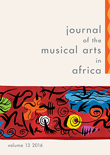
Journal of the Musical Arts in Africa
Celebrating the Symphony of African HeritageThe Journal of the Musical Arts in Africa is a premier academic publication dedicated to exploring the rich and diverse musical traditions of the African continent. Published by ROUTLEDGE JOURNALS, TAYLOR & FRANCIS LTD, this journal offers a vital platform for researchers, professionals, and students in the field of musicology. With an ISSN of 1812-1004 and E-ISSN of 2070-626X, the journal has established itself as a significant contributor to the scholarly discourse surrounding African musical practices. With an impact factor reflecting its growing influence, the Journal of the Musical Arts in Africa is categorized in the Q3 quartile of music journals according to the latest metrics, placing it among an essential cadre of publications in the field. The journal invites original research articles, reviews, and critical essays that aim to expand the understanding of music as an integral part of African culture. It has been continuously publishing since 2004 and encompasses a wide range of topics, making it a must-read for anyone interested in the intersections of music, culture, and identity on the African continent. The journal stands as a testament to the vibrant musical heritage of Africa and encourages scholarly contributions that highlight the importance of music in reflecting and shaping societal values.

Problemy Muzykalnoi Nauki-Music Scholarship
Enhancing Understanding of Music's Diverse DimensionsWelcome to Problemy Muzykalnoi Nauki-Music Scholarship, a leading journal in the field of music scholarship published by the esteemed Gnesin Russian Academy of Music. With an ISSN of 2782-358X and an E-ISSN of 2782-3598, this Open Access journal has been committed to the dissemination of high-quality research since 2009, making scholarly work accessible to a global audience. Covering diverse aspects of music theory, history, and its socio-cultural impacts, Problemy Muzykalnoi Nauki serves as an essential platform for scholars, educators, and practitioners in the arts and humanities, as well as in social sciences related to music education. While its Scopus coverage was discontinued in 2021, the journal remains influential, holding a rank of #48 in the Arts and Humanities category and a percentile of 67th, showcasing its relevance and rigor in the discipline. We invite researchers and students alike to explore the rich contributions made within these pages, fostering a deeper understanding and appreciation of music in contemporary society.
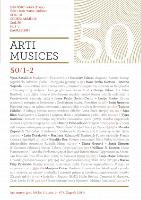
Arti Musices
Uncovering Regional Perspectives in Global MusicologyArti Musices is a distinguished open-access journal published by the Croatian Musicological Society since 2007, dedicated to advancing the field of musicology and related arts and humanities disciplines. Operating from Zagreb, Croatia, this journal aims to provide a platform for scholarly communication, fostering international dialogue among researchers, musicologists, and practitioners. Although it has a current Scopus ranking in the bottom quartile within its category (Q4 in Music), it offers a unique perspective on the musicological landscape, particularly from a regional standpoint. Researchers seeking to contribute to or glean insights from this evolving field will find that Arti Musices serves an important role in disseminating innovative ideas and empirical research. The journal accepts submissions across a broad spectrum of music-related topics, inviting contributions that reflect the complexities and cultural contexts of music today.
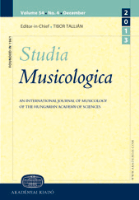
Studia Musicologica
Unveiling the Rich Tapestry of Music's HistoryStudia Musicologica, published by AKADEMIAI KIADO ZRT, stands as a leading journal in the field of musicology, dedicated to the exploration and analysis of music across diverse cultures and historical contexts. With its ISSN 1788-6244 and E-ISSN 1789-2422, this journal provides an essential platform for disseminating high-quality research and critical analyses, thereby contributing significantly to scholarly discourse in music studies. Although it operates on a traditional access model, its rigor and foundational contributions ensure that it remains invaluable for researchers, professionals, and students alike. Situated in the heart of Hungary, Studia Musicologica engages with a broad spectrum of topics including music theory, ethnomusicology, and music history, fostering a deeper understanding of music's multifaceted role in society. This makes it an essential resource for anyone interested in advancing their research or professional practice within the expansive field of musicology.

Studia Universitatis Babes-Bolyai Musica
Advancing the Frontiers of Music ResearchStudia Universitatis Babes-Bolyai Musica is a prestigious academic journal dedicated to the field of musicology, published by UNIV BABES-BOLYAI. Since its inception, it has strived to foster scholarly communication and share groundbreaking research that spans various music-related disciplines, including ethnomusicology, music theory, and performance studies. The journal operates under an Open Access model since 2021, ensuring that its content is freely accessible to a global audience of researchers, professionals, and students interested in advancing their knowledge and understanding of music. By providing a platform for high-quality, peer-reviewed articles, Studia Universitatis Babes-Bolyai Musica plays a vital role in promoting significant contributions to the evolving discourse in music studies. Its commitment to intellectual rigor and openness aligns with contemporary academic trends, making it an essential resource in the realm of music research.

HUDEBNI VEDA
Advancing Research in Musical ScholarshipHUDEBNI VEDA is a distinguished journal published by the Czech Academy of Sciences Press, specializing in the field of music. With its ISSN 0018-7003 and E-ISSN 2694-6998, this journal serves as a vital platform for scholarly communication in music studies, promoting innovative research and critical discourse. Since its inception in 2002 and scheduled for continuation until 2024, it has emerged as a respected publication within the music academic community, though currently holding a Category Quartiles ranking of Q4 in Music. Notably, it ranks #127 out of 180 in the Scopus Arts and Humanities - Music category, placing it in the 29th percentile. While it operates under traditional access constraints, HUDEBNI VEDA is committed to fostering an inclusive academic environment, inviting contributions that push the boundaries of musicology. This journal is essential for researchers, professionals, and students eager to explore and engage with contemporary issues and developments in the study of music.

MUSIKFORSCHUNG
Bridging Historical and Contemporary Musical InsightsMUSIKFORSCHUNG is a distinguished journal in the field of music studies, published by NEUWERK-BUCH UND MUSIKALIENHANDLUNG in Germany. With its ISSN 0027-4801, the journal caters to scholars, practitioners, and students interested in the diverse realms of musicology. Although it is currently not an Open Access publication, MUSIKFORSCHUNG plays a vital role in the academic landscape by disseminating research and critical discourse on music from various historical and contemporary perspectives. The journal has established its worth in the academic community, being categorized in the Q4 quartile in Music for 2023 and holding a rank of #169 out of 180 in the Scopus Arts and Humanities Music category, placing it within the 6th percentile. With publication activities spanning from 2002 to 2013 and resuming in 2016 through to 2024, MUSIKFORSCHUNG continues to be a crucial resource for those dedicated to advancing music scholarship. Set in the cultural heart of Kassel, Germany, the journal invites contributions that foster an understanding of music's impact on society and culture.
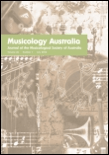
Musicology Australia
Fostering Critical Discourse in MusicologyMusicology Australia is a leading journal published by Routledge Journals, Taylor & Francis Ltd, specializing in the field of musicology and the study of music within the context of Australian culture. With its longstanding legacy dating back to 1964, this peer-reviewed journal offers a platform for innovative research and critical discourse that engages with a diverse range of topics in music studies. While it is ranked in the third quartile (Q3) for music in 2023 and holds a Scopus rank of #102 out of 180 in the Arts and Humanities, its contributions are vital for both established scholars and emerging researchers. The journal is based in the United Kingdom, with headquarters located in Milton Park, Abingdon. Although currently unavailable for open access, Musicology Australia remains committed to enhancing the understanding and appreciation of music in a global context, making it an essential resource for researchers, professionals, and students alike.
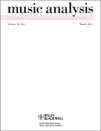
MUSIC ANALYSIS
Unlocking the Secrets of Musical InfluenceMUSIC ANALYSIS, published by WILEY, is a prestigious journal in the field of musicology, recognized for its critical contributions to the analysis of music and its myriad influences on culture and society. With an ISSN of 0262-5245 and an E-ISSN of 1468-2249, this journal has established itself as a vital resource for researchers, professionals, and students alike, boasting a Q1 ranking in the 2023 category of Music. As part of a highly competitive field, it ranks 70th out of 180 in the Arts and Humanities Music category on Scopus, positioning it within the 61st percentile. MUSIC ANALYSIS serves as an essential platform for innovative research and insightful discourse, engaging with musical theory, practice, and education from 1996 to 2024. Its commitment to fostering rigorous scholarship makes it indispensable for those seeking to deepen their understanding of music and its analytical frameworks. Although it does not offer Open Access options, its relevance and impact in the genre ensure accessibility through institutional subscriptions and university libraries.